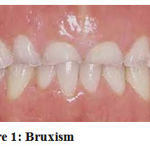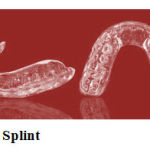Manuscript accepted on :August 05, 2016
Published online on: 27-08-2016
Plagiarism Check: Yes
K. Ramesh
Tutor, Dept. of Oral Pathology, Sree Balaji Dental College and Hospital, Pallikkaranai, Chennai – 600 100.]]
Corresponding Author Email :drrameshmalar@gmail.com
DOI : https://dx.doi.org/10.13005/bpj/1011
Abstract
Bruxism is a repetitive action of jaw muscle characterized by grinding of teeth and/or by thrusting of the mandible. It has two distinct manifestations that is it happen during sleep or wakefulness, namely known as sleep bruxism and awake bruxism.
Keywords
Bruxism; Splints and mouthguards; psychological factors
Download this article as:| Copy the following to cite this article: Ramesh K. Bruxism: A Short Review. Biomed Pharmacol J 2016;9(2). |
| Copy the following to cite this URL: Ramesh K. Bruxism: A Short Review. Biomed Pharmacol J 2016;9(2). Available from: http://biomedpharmajournal.org/?p=8166 |
Introduction
The word ‘Bruxism; originated from Greek word brukhein meaning ‘gnash the teeth’. It also means involuntary habitual grinding of the teeth, typically during sleep.
Bruxism, also termed as teeth grinding, is the immoderate grinding of the teeth and/or clenching of the jaw and is an oral parafunctional activity. It is defined as: “A movement disorder of the masticatory system charactized by teeth-grinding and clenching during sleep as well as wakefulness.”(1) (Figure 1)
 |
Figure 1: Bruxism
|
Discussion
Causes
The cause of bruxism is not always clear. In the dental profession there is widespread belief that bruxism and dental occlusion are causally related. However there is little evidence to support this belief. Some of the causes of bruxism are: (a) Sleep Disorders, (b) Lifestyle Factors, (c) Stress, Anxiety & other Psychological Components. (2)
Various Researches has consistently found that bruxism rarely occurs alone, it is found more frequently in those who have an existing sleep disorder such as snoring, breathing pauses during sleep, Obstructive Sleep Apnoea (OSA), and other parasomnias. Of these, OSA appears to be the highest risk factor as it is associated with an arousal response. Lifestyle factors such as smoking, alcohol consumption, caffeine intake , which are associated co-factors of bruxism, leads to problems like staying asleep and daytime sleepiness. Bruxism is significantly higher in individuals whose lifestyle includes the use of psychoactive substances. Nearly 70% of bruxism occurs due to stress or anxiety and similar psychosocial factors, like job related stress.(2)
Bruxism in kids
Every 2 to 3 out of 10 kids will grind or clench, experts say, but most outgrow it. Bruxism often happens during deep sleep phases or when kids are under stress. Sometimes kids may grind improper alignment of teeth, a response to pain, such as from an earache or teething, and nervous tension. Some kids who are hyperactive also have bruxism. And sometimes kids with other medical conditions (such as cerebral palsy) or who take certain medicines can develop bruxism.(3)
| Comparison of typical features of sleep bruxism and awake bruxism. (4-6) | ||
| Sleep bruxism | Awake bruxism | |
| Occurrence | While asleep, mostly during periods of sleep arousal | While awake |
| Time-intensity relationship | Pain worst on waking, then slowly gets better | Pain worsens throughout the day, may not be present on waking |
| Noises | Commonly associated | Rarely associated |
| Activity | Clenching and grinding | Usually clenching, occasionally clenching and grinding |
| Relationship with stress | Unclear, little evidence of a relationship | Stronger evidence for a relationship, but not conclusive |
| Prevalence (general population) | 9.7–15.9% | 22.1–31% |
| Gender distribution | Equal gender distribution | Mostly females |
| Heritability | Some evidence | Unclear |
Treatment
In many cases, treatment isn’t necessary. Many kids outgrow bruxism without treatment, and many adults don’t grind or clench their teeth badly enough to require therapy. Splints and mouth guards are designed to keep teeth separated to avoid the damage caused by clenching and grinding. Certain therapies may help relieve bruxism, such as: Stress management, Behavior therapy and Biofeedback.
Recommended treatments for bruxism include behavioural therapies and using mouth guards or mouth splints.(Figure 2) Other treatments, such as muscle relaxation exercises and sleep hygiene measures, may also help to manage the symptoms.(7) Yoga, deep breathing, massage, reading, having a bath, listening to music before sleep can help in treating psychological factors for bruxism. In general, medications aren’t very effective for treatment of bruxism, and more research is needed to determine their effectiveness.(7)
 |
Figure 2: Splint
|
Summary
Bruxism commonly known as teeth grinding mainly related to sleep disorders, lifestyle factors, and psychological factors can be treated with few therapies, as medications are not effective.
References
- Wassell R, Naru A, Steele J, Nohl F (2008). Applied occlusion. London: Quintessence. pp. 26–30. ISBN9781850970989.
- http://www.bruxism.org.uk/causes-of-bruxism.php.
- http://kidshealth.org/parent/general/teeth/bruxism.html#.
- Manfredini D, Winocur E, Guarda-Nardini L, Paesani D, Lobbezoo F (2013). “Epidemiology of bruxism in adults: a systematic review of the literature”.Journal of Orofacial Pain 27 (2): 99–110. doi:11607/jop.921. PMID 23630682.
- Shetty S, Pitti V, Satish Babu CL, Surendra Kumar GP, Deepthi BC (September 2010).”Bruxism: a literature review”. Journal of Indian Prosthodontic Society 10 (3): 141–8.doi:1007/s13191-011-0041-5. PMC 3081266. PMID 21886404.
- Macedo, Cristiane R; Machado MAC; Silva AB; Prado GF (21 January 2009).”Pharmacotherapy for sleep bruxism”. Cochrane Database of Systematic Reviews (John Wiley & Sons, Ltd).doi:1002/14651858.CD005578.
- http://www.nhs.uk/Conditions/teeth-grinding/Pages/Treatment.aspx.







